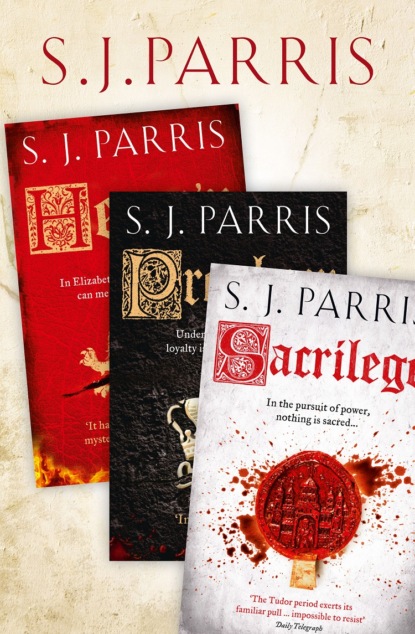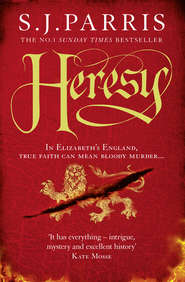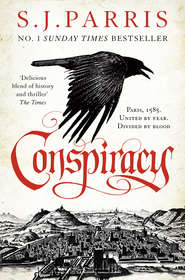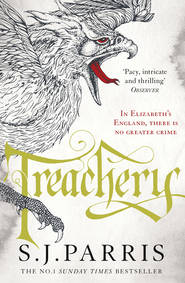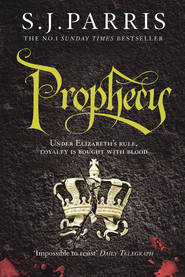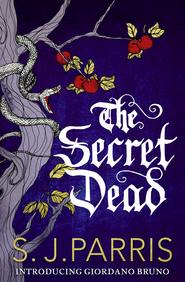По всем вопросам обращайтесь на: info@litportal.ru
(©) 2003-2025.
✖
Giordano Bruno Thriller Series Books 1-3: Heresy, Prophecy, Sacrilege
Автор
Год написания книги
2019
Настройки чтения
Размер шрифта
Высота строк
Поля
‘That is very good, Humphrey – do you know any more?’ I whispered back. He beamed and leaned in again, but at that moment the landlady’s shrill voice broke in.
‘Humphrey Pritchard! Did I not tell you to leave the poor gentleman alone? Ha’n’t you got work to do? He don’t want to listen to your foolishness – let him enjoy his meal in peace.’ With this misplaced optimism, she appeared suddenly at Humphrey’s shoulder, cuffed him lightly around the back of the head and shoved him towards the kitchen. Though he was twice her size, his face crumpled with guilt and he scurried away, his big body hunched miserably.
The landlady wiped her hands on her apron and forced a smile.
‘He wasn’t saying anything, ah – offensive, I hope?’ she asked, but I thought I caught a note of anxiety in her voice.
‘Not at all,’ I said. ‘He was only asking if the food was all right.’
Her eyes narrowed.
‘And is it?’
‘Mm. Thank you.’
She looked at me for a moment as if she wanted to add something, then nodded curtly and disappeared into the kitchen, where I heard the sound of muffled voices, hers berating poor Humphrey and his raised in protest.
Dinner was an uncomfortable affair; I forced as little of the grim stew as possible through my clenched teeth, conscious all the while of the level stare of the earless man and his cronies in the corner. I half-hoped he would at least come across and confront me, perhaps explain why he looked at me with such interest or familiarity, but he remained in his seat, stirring only occasionally to lean across and murmur something to one of his companions.
I kept my eyes on my plate, my mind chasing after fragments of conversation. Ora pro nobis. Pray for us. The words written in code in the back of Roger Mercer’s almanac. A prayer of intercession, a fragment of the Ave Maria or the Litania Sanctorum, for where else would an uneducated man like Humphrey learn Latin except from the responses of the Mass? So young Humphrey Pritchard had either overheard or taken part in Catholic liturgies. Had he heard those words through association with people he knew from the tavern? That would explain why his employer was so keen to keep him from talking to strangers. And why had Mercer written out that same phrase in code? A password, perhaps, or a sign to be recognised among co-conspirators. Was the Catherine Wheel some kind of meeting place or safe house for secret Catholics – was that what my enigmatic correspondent at Lincoln College was trying to steer me towards?
I realised that I had been staring at the earless man as I contemplated this; almost as if he had been stirred into life by my thoughts, at that moment he rose to his feet, brushed down his doublet and called to the landlady to settle his bill.
‘Alas, Widow Kenney, I must leave you for now – though it is the Sabbath, business presses as always,’ he announced, and I was surprised to hear that he had an educated accent. It made a disconcerting contrast with his appearance, which gave him the look of a common criminal. Once again, I had to reprimand myself for making hasty judgements on a man’s manner or looks. I waited until the door had swung shut behind him before following suit; if Widow Kenney saw anything suspicious in my haste to leave, it was indistinguishable from her habitual expression, and she thanked me flatly as I threw some coins on the table and hurried out of the door, craning my neck in both directions along the street in the hope that I would still have the earless man in sight.
I was in luck; he had almost reached the top of the street by the church. Keeping again to the shadow of the buildings on my left, I told myself that this pursuit was far more worthy of one of Walsingham’s agents, and I found I was relishing the drama of the moment and the rush of adrenalin in my veins.
The earless man crossed the broad street and passed under the North Gate, by the church of St Michael and the Bocado prison. I followed him at a safe distance along Sommer Lane, past the front of Exeter College and the rear wall of the Divinity School; at one point, I had the sense that someone was following me and turned sharply, but there were only a handful of people in the street, all going about their business without apparently taking any notice of me, so I put it down to heightened nerves and kept my eyes fixed on the earless man.
At the corner of the University Schools, he turned right into the narrow lane called Catte Street, where the houses stood closer together, the timber-framed upper storeys overhanging the road so that it stood in shadow, keeping the ground still wet underfoot. From the abundance of painted signs jutting out from the buildings, groaning gently in the wind, it was clear that this was a commercial street; closer inspection revealed businesses catering to the needs of an academic community: printers, stationers, makers of robes and regalia and a number of book dealers and binders, all shuttered and closed.
The earless man slowed his pace and I followed suit, just as I noticed a figure coming towards us from the other direction, dressed in a black academic gown and velvet cap. He carried himself stiffly, like an old man, and his steps were halting, as if he found walking effortful. The earless man stopped in front of a narrow shop front with grimy windows and raised a hand in greeting; the figure in the cap made a small gesture of acknowledgement in return. I ducked into a doorway just as he drew level with the shop and removed his cap, checking the street as if anxious not to be seen, and I realised then that it was Doctor William Bernard. Without speaking, the earless man removed a ring of keys from his belt and unlocked the dingy shop; I shrank back further out of sight as, with a last glance in both directions up the street, he held the door open for Doctor Bernard and followed him in through the low doorway. The door closed and I heard the lock click behind them. The shop had no sign above, but as I stepped out from the doorway and drew as close as I dared, though it was unlikely that much of the street could be seen through the thick film of dirt encrusting the diamond panes of the only window, I saw that painted above the doorway, in small but carefully wrought letters, were the words R. Jenkes. Bookbinder and Stationer.
Turning from the shop, I slammed straight into a tall man with a hat pulled down low over his face, almost causing him to fall over.
‘Scusi,’ I said instinctively, as he too muttered an apology and hurried away up the street. The sight of his retreating back left me oddly unsettled; I wondered that I had not noticed him in the street before. Could he have stepped out from one of the shops? It seemed unlikely; all were closed, and I remembered the moment before I turned into Catte Street, when I had sensed I was being followed. The man turned down a side alley without looking back. I had seen almost nothing of his face except that he had a dark beard; I could not recall if any of the earless man’s companions from the Catherine Wheel had had a dark beard, but I had not observed them closely and they had been sitting with their backs to me. Why would I have been followed from the tavern, I wondered, unless it was because my presence there alone had aroused their suspicions, or because I had made it so obvious that I was in turn eager to follow the earless man?
I made my way back down Catte Street towards the city wall, my thoughts spinning. Who was that earless man, who had associates among the tavern low-lifes and the doctors of Lincoln College? If he was Jenkes the bookbinder himself, that might explain his connection with the academics, but it was curious that Bernard should choose a Sunday to do business with a stationer; indeed, the old doctor had looked very much as if he hoped not to be seen. Were I to seek the most obvious explanation, I might reason that if the Catherine Wheel was a known meeting place for recusants, and since Bernard was a sympathiser with the old faith, and the one man who linked the two dealt in books, was it not highly likely that I had stumbled upon some connection to the city’s underground trade in banned books, of which Walsingham had spoken with such fury? Except that I had not stumbled upon it, I reflected; someone had deliberately and cryptically pointed me to this discovery, someone who had also made sure I linked it with Roger Mercer’s death, and I must find out the source of this information, and what he feared from making himself known.
I walked back past the Divinity School and turned left into St Mildred’s Lane; the gatehouse tower of Lincoln College loomed up on my left, squat and pale against the sky. As I passed through the main gate and under the tower arch, I heard a knocking on the window of the porter’s lodge and looked around to see Cobbett waving for me to come in.
‘Feller come looking for you just now, Doctor Bruno,’ he said, wheezing furiously, as if he had been the one carrying the urgent message. ‘Servant from Christ Church, wanted to know if you’re going hunting at Shotover this afternoon.’
I cursed quietly; in all the excitement of my discovery of the Catherine Wheel, I had completely forgotten my promise to Sidney and my intention of excusing myself in person. At least now, with any luck, I would be too late to join them.
‘I can’t,’ I said, half to myself. ‘I suppose I had better go and leave a message for my friend.’
‘No,’ said Cobbett, sympathetically. ‘I didn’t think you looked the hunting sort. Bit short for a longbow, if you don’t mind my saying.’
I only nodded and turned to leave. Then I suddenly remembered Sidney’s advice about the college porters and their storehouse of information, and the bottle of ale we had bought to encourage Cobbett to talk freely, which was still sitting in my room.
‘Would you like a drink, Cobbett?’ I asked.
‘Why, it’s almost as if you read my own thoughts, Doctor Bruno.’ He flashed his knowing, gummy grin. ‘I was just thinking I’m parched near to the death. Almost witchcraft, that is.’
‘No witchcraft, I assure you. I know a thirsty man when I see one. Wait for me here a moment,’ I said, smiling, and he sat back heavily on his chair.
‘Oh, I won’t go nowhere, don’t you worry. Might even see if I have a clean cup. Not used to guests, are we, Bess?’ he said, gently scratching the old dog behind her ears. She made a small gurgling noise from the back of her throat.
When I returned with the bottle, Cobbett pulled out the stopper eagerly and poured a generous amount into two wooden cups placed on his table for the occasion. I tried not to look too closely at the state of the cup he passed me, his round face creased into a smile of satisfaction as he indicated to me to pull up a low stool tucked into the corner of his small room.
‘Good ale and good company,’ he said, when he had taken a long draught from his cup and swilled it around his mouth before swallowing noisily. ‘Now then. I sense you have a question. I can read minds too, you know.’ He winked.
With Cobbett, I had decided, my best course would be to match his frankness; he would see straight through any pretence.
‘Have you ever come across a bookbinder in Catte Street by the name of Jenkes?’ I asked.
Cobbett threw back his head and launched into one of those fits of guffaws that made me fear for his health. When he had recovered from the wheezing he turned an incredulous look on me and wiped his mouth with the back of his hand.
‘Holy God and all his saints, Doctor Bruno, what have we done to you?’ He shook his head, still laughing. ‘You arrive in Oxford in the company of the highest men in the land, and in a matter of days you’re consorting with the most notorious rogue in the city! Stay well away from Rowland Jenkes, that’s all I have to tell you.’
‘How, notorious? A mere bookbinder?’
‘Not a mere anything, Rowland Jenkes. A papist and a sorcerer.’
‘Really?’ My interest was piqued now; Cobbett knew an eager audience when he saw one.
‘Have you never heard of the Black Assize?’ he said, adopting a portentous tone.
I shook my head.
Cobbett leaned forward with all the relish of a grandfather preparing a tale to frighten small children.
‘Well, now,’ he said, and a frustrating extended pause followed while he drained his cup and generously poured himself another. ‘Six years ago, summer of 1577 it was, and cursedly hot, Rowland Jenkes was arrested for sedition and imprisoned in Oxford castle, where they keep prisoners until the local Assizes are held.’
‘What manner of sedition?’
‘I’m coming to that, hold your horses,’ Cobbett grumbled. ‘Well, on this occasion he’d been found to be distributing seditious books, you know – papist books, ones they don’t allow to be printed here. Shipping them in illegally from France and the Low Countries – they say he has some Flemish blood, but that might just be gossip and I never pay any mind to gossip.’
‘No,’ I said, nodding sincerely.
‘No. Well, he was arrested for the books and some witnesses popped up to say they’d heard him speak treasonable words against the queen. But it was during his trial the terrible business happened. He was brought to the Shire Hall, just outside the prison wall, with all the other prisoners to be tried before the Lord High Sheriff and the Lord Chief Baron. Naturally, he was found guilty and just at the moment his sentence was pronounced, the courtroom was filled by the most foul stench you could imagine, such that everyone in the room thought as how they might choke or faint with it.’
He paused again for refreshment, and I found myself jigging impatiently on the edge of my stool.
‘And then?’
‘Well, now, you will hardly credit this but I know folk who saw it with their own eyes, Doctor Bruno,’ Cobbett whispered, his own eyes growing wide with the momentum of his story. ‘Every man on that jury died within a few days. Not only them, but every man jack in that courtroom, all of them, stone dead before a week was out. The sheriff, the baron, the sarjeants – all of them. Three hundred men died in Oxford over the course of a month. Then it was all over as quick as it come. But, here’s the thing …’ He leaned in even closer, so that his chin was almost in his beer. ‘Not a one of the prisoners who was in the Assize that day died, nor any woman nor child. Now, you can’t tell me that was any natural plague.’





